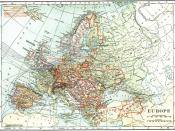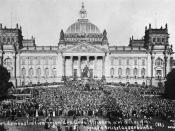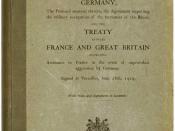As the First World War came to an end, the time for negotiating peace had approached. There were a number of attempts made to bring about peace negotiations. Woodrow Wilson was the spokesman for the allies and he created the best known of all the peace proposals known as the fourteen points.
The Fourteen Points were presented in a speech before both houses of Congress and were intended to generate support for Wilson's vision of the postwar world, both at home and also among allies in Europe. Further, the president hoped that the promise of a just peace would be embraced by the populations in enemy nations and generates momentum for ending the war.
By 1918 Germany was being defeated on most fronts and the Russians had negotiated a peace. The German people were hungry, war weary and demanded peace. The German government eventually asked for an armistice, and on November 11, 1918, a cease-fire began.
But still the problem of peace remained. In response to the fourteen points, the Paris Peace Conference was organized. This is where the Treaty of Versailles was decided.
'The Big Four' made major the decisions at the conference and in the making of the treaty. The big four included Clemenceau of France, George of Great Britain, Orlando of Italy, and Woodrow Wilson of the United States. Germany and the defeated states were not invited to attend the conference. This made Germany angry, because they had no say in the future of their country. They felt that this was an enforced peace. This made Germany bitter towards the allies because they were in to punish the Germans severely. The Germans were more trusting towards America, whom they felt would make this a fair treaty and let the defeated nations have their say.
When the Versailles Treaty was signed, few of Wilson's fourteen points were adhered to, though a 'League of Nations' was set up. The League of Nations was set up as a peace keeping force to prevent future war. But when Wilson put to the senate to join they refused.
Germany hated the Treaty of Versailles due to the land lost because of it. The allies punished Germany very severely. The treaty was so harsh because Clemenceau wanted to make sure that France was secure from German attack. There were many other reasons why Germany disliked the Treaty of Versailles. All Germany's gains at the Treaty of Brest-Litovsk with Russia on March 3, 1918 were surrendered to the allies. Germany lost all of its overseas colonies. These were given to other countries as mandates. Germany also disliked the treaty because its armed forces were cut. The treaty demilitarized Germany. Their army was reduced to 100,000 men and conscription was disallowed. They were allowed no more weapons. No tanks, aircraft or heavy artillery were to be manufactured for the German armed forces. German navy was reduced to six battleships, six light cruisers, twelve destroyers, and twelve torpedo boats. Another aspect the Germans despised from the Treaty of Versailles was Reparations. France wanted money to pay for the damages it took during the war as much of the fighting was done on French soil. They demanded this money from the Germans because they had total blame for starting the war. Germany thought that the treaty was completely unfair and the treaty had put a large burden on their economy as well as the people of Germany.
The First World War ended with Europe scarred by trenches, spent of resources, and littered with the bodies of the millions who had died in battle. Another result of the war and the treaty was the creation of new borders and many new countries within Europe itself. This is because the Treaty of Versailles forced countries such as Germany and Austria to give up much of their land.
Although the Treaty of Versailles was the official end of the war and formally made peace, the provisions did not exactly address the main causes of the war. Wilson's fourteen points began to deal with imperialism, militarism, nationalism, and alliances, but the fourteen points were rejected. The Treaty of Versailles mainly focused on punishing Germany. Clemenceau, George, and Orlando sought to get their "Pound of Flesh." The Treaty rebuked Germany by reducing their army, blaming them for the war, and making them pay billions of dollars of reparations.
The Treaty of Versailles had created feelings of revenge from Germany towards the allies. Although it was meant to produce peace it seemed to plant the seeds to a future and more vicious war. The Treaty led to a chain of events that lead to World War II. Because the allies had made Germany responsible for war damages and had taken away their military, it was easier for Hitler to come into power since Germany was in a difficult position.


